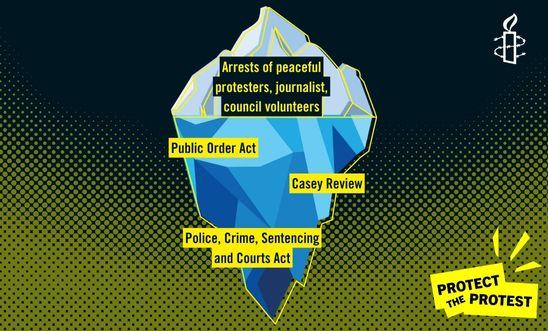
Why anti-protest policing over the Coronation weekend is the writing on the wall

Anti-protest policing by the Metropolitan Police during the Coronation was the writing on the wall
The writing has been on the wall for years. Our fundamental rights to peaceful protest are rapidly disappearing as police forces begin to use the vast range of new anti-protest powers given to them under last year's Police, Crime, Sentencing and Courts Act and this year's Public Order Act.
The Public Order Act only received Royal Assent and became law in the days prior to the Coronation of King Charles that took place on Saturday 6 May 2023.
Police made several arrests using the powers given to them under these new public order powers on grounds that they might be involved in disruptive protests in and around the Coronation. These arrests included:
- 6 members of the campaign group Republic
- 3 members of a volunteer group working to protect women as an initiative of the Westminster Council
- An individual watching the celebrations who was mistaken for protesters that were nearby
- A journalist who was covering the protests.
After several hours in police custody, all were released without charge.
Last weekend’s Coronation policing by the MET has been years in the making. It’s the tip of the iceberg 🧊
Our right to peaceful protest has been firmly chiselled away- only to reveal a slide towards authoritarianism
Join to #RepealAntiProtestLaws https://t.co/jHcoZJZ7OY
— Amnesty UK (@AmnestyUK) May 12, 2023
What's so wrong with these laws?
As these new laws made their way through Parliament, Amnesty repeatedly warned of the dangers of vague and overly broad and subjective definitions, alongside alarmingly low thresholds to justify any police action.
We warned this would inevitably give rise to police misusing those powers to prevent peaceful and lawful protests. We also warned that the powers were so broad and subjective, that anyone, including bystanders not connected with a specific protest, could be caught up in the restrictions and subject to arrest or be stopped and searched.
The arrests made on Saturday provide real life examples of those warnings coming to fruition, demonstrating why it’s imperative that these draconian and repressive anti-protests laws are scrapped at the earliest opportunity.
But that's not the whole story...
What’s more sinister is the thresholds to justify police action against protesters and protests have been lowered significantly in these laws. When police and Government ministers use the phrase “serious disruption”, it is important to remember that the definition of “serious disruption” in the Public Order Act 2023 is “anything more than minor”.
In addition, similar low bar justifications are now available to restrict peaceful protest on grounds of noise and causing a public nuisance, which were given to the police in last year’s Police, Crime, Sentencing and Courts Act 2022.
Most people will be of the view that “serious disruption" would include things like physically stopping the procession, or interrupting the Coronation ceremony itself in some way, not the mere holding of campaign placards or expressing views critical of the Monarchy, which should never be used as a justification to prevent peaceful protest.
How were these arrests being justified?
In other areas, the police and Government ministers have sought to justify the use of these new anti-protest powers based on intelligence they received that some individuals were going to disrupt proceedings by throwing paint during the Coronation procession. Clearly this isn’t a correct justification of the new powers, given the fact that numerous pieces of existing legislation would have given ample powers to the police to take action.
They clearly wouldn’t need any of the new provisions to be able to prevent that sort of serious disruption from taking place.
Three members of the Westminster’s Night Stars women’s safety team were arrested on suspicion of conspiracy to commit public nuisance in the early hours of Saturday 6 May using powers given to the police under the Police, Crime, Sentencing and Courts Act 2022. They were arrested because they were in possession of a number of rape alarms as part of their night patrols to protect women’s safety. All three were released without charge.
The pre-emptive arrest of three members of police-sponsored volunteers who hand out rape alarms to better protect women on the streets of London at night, is a total failure of proportionate community-based policing.
These powers to arrest people for carrying rape alarms were used despite the very recent devastating independent review of the Met Police by Baroness Casey that concluded the Met was failing women and children against a backdrop of institutional racism, sexism and homophobia.
Arrests like these, made during the Coronation, provide real life chilling examples of new powers being misused to further erode everyone’s fundamental rights to protest and express their views peacefully.
It is imperative that these draconian and repressive anti-protests laws are scrapped at the earliest opportunity.
We will continue to campaign to protect the right to peaceful protest, in the UK and around the world. Will you join us?
People in power don't expect us to know our rights: which is why we must. Join our free online course on protest rights here.
Our blogs are written by Amnesty International staff, volunteers and other interested individuals, to encourage debate around human rights issues. They do not necessarily represent the views of Amnesty International.
0 comments